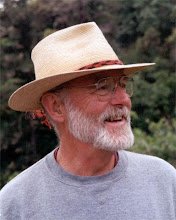Until recently shamanism was a relatively obscure subject studied by a small group of anthropologists. Michael Harner, an anthropologist who had done his field work in NW native tribes and the Upper Amazon, popularized the subject by dropping out of academia and teaching shamanic techniques in workshops at Esalen, patterned after the more widespread activities in the human potential movement, also centered at Esalen. Harner wrote several books on the subject.
Meanwhile, Carlos Castaneda, did a graduate thesis on shamanism at UCLA, and wrote a series of wildly popular books on the subject. His work, unlike that of Harner, was highly controversial and there were charges that he made the whole thing up. Nevertheless, both men had a huge influence on moving the subject of shamanism into the popular culture, and into at least part of the practice of humanistic psychology. If one went to Esalen in the early period to study with Harner as I did, the majority of participants were involved in some way with humanistic work or one of its offshoots.
A couple of years ago I wrote a brief essay on how shamanism erupted out of the human potential movement at Esalen and became subsumed into a new age, humanistic culture. (Shamanism, Anarchy & The End of The World) Harner invented “shamanic counseling,” one of his later students, Sandy Ingerman, a masters level counselor, brought a shamanic practice known as “soul retrieval” into the popular domain, etc.
Shamanism not only became a part of humanistic psychology it can also be found in body work, massage, crystal therapy, dance, art, etc. etc., all of which tends to confuse us on the subject. Huge ethical questions are raised by all of this. Today you can go on the internet, pay a fee and receive a soul retrieval from someone in another state or country. You can travel to workshops in far corners of the world and learn techniques from shamans, or others pretending to be shamans. In short, there is now a “shamanic industry.” It is, to put it plainly, a mess.
Or is it? Maybe substance can be expressed in infinite ways and the forms of the expressions are not relevant. …??? More on this later.
Subscribe to:
Post Comments (Atom)

No comments:
Post a Comment
Thank you for your comment. After review it will be posted. This can take up to a day or two.